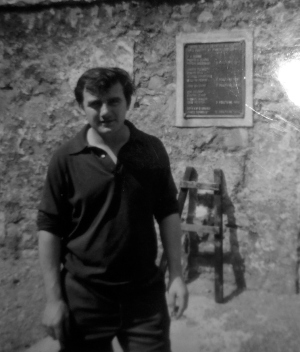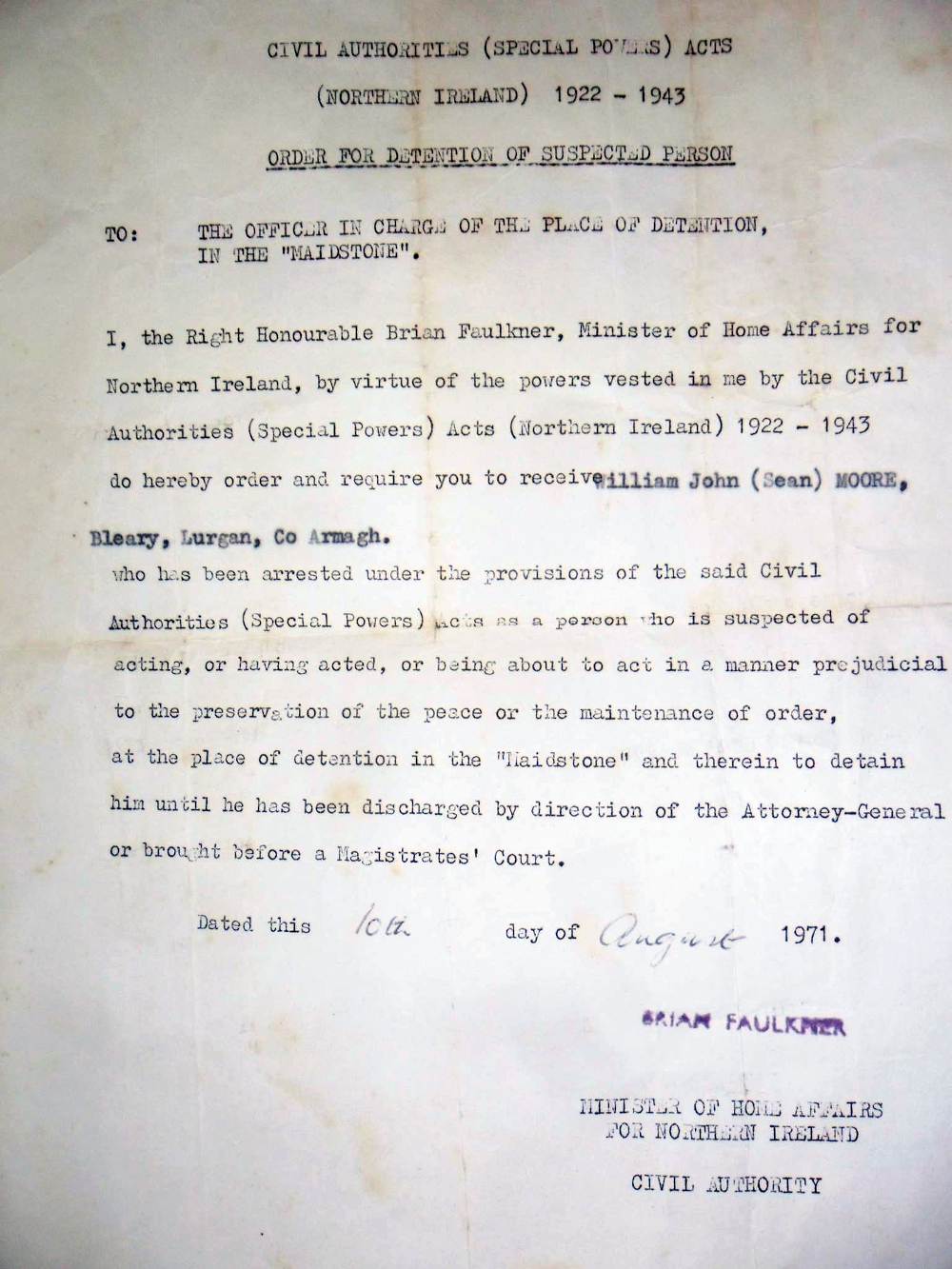Dieter Reinisch: When Armagh County Court ruled internment unlawful

Seán Moore visiting Kilmainham
Gaol in Dublin, 1969
Historian Dr Dieter Reinisch looks back at some of the earliest legal challenges to internment, in light of last year’s high-profile UK Supreme Court ruling in R v Adams.
Last year, the UK Supreme Court ruled the detention of former Sinn Féin President and TD for Co Louth, Gerry Adams, unlawful. The five justices of the UK’s highest court judged unanimously that Adams’ detention did not fulfil the requirements of the Detention of Terrorists (Northern Ireland) Order 1972. This decision prompted nearly 50 former internees to issue proceedings against their internment.
Following the introduction of internment in Northern Ireland, almost 2,000 people were detained without trial between August 1971 and December 1975. Hundreds of former internees could be compensated because of the ruling in favour of Adams. Yet, a County Court in Lurgan, Co Armagh, had already ruled detention without trial unlawful in the case Moore v. Ministry of Defence et al. on 10 February 1972. The plaintiff, William John Moore, was interned on the HMS Maidstone in August 1971. A 1976 academic study called the case “the first crack in the Special Powers Act”.
William John Moore was born on 8 August 1945 in Gilford, Co Down. From his early youth, he solely used “Seán” as his first name. On 14 August 1967, he married Nuala McKerr in St. Peter’s Church in Lurgan. Nuala was raised in a republican family, and soon, Seán became active as well. Together with J.B. O’Hagan, he joined the Civil Rights Association in Lurgan, and through IRA veteran Art McAlinden he became involved in the Republican Movement. After the 1969/70 split, he joined the Provisionals.
The newlywed Moores moved into a bungalow in Bleary, just outside Lurgan. Daughter Dara and son Seán Óg were born in the following years. At 4:10 in the morning on Monday, 9 August 1971, about half a dozen military police officers entered the house and arrested Seán Moore. He was taken to Pinehurst Factory in Lurgan, where the British army was billeted. A few hours later, Seán and his two brothers-in-law, Barry and Gerry McKerr were brought to Ballykinlar Camp near Newcastle, Co Down. Gerry McKerr was to become one of the 14 men who were chosen for “special treatment” and were taken to a secret interrogation centre. These men were tortured and became known as the Hooded Men.
The treatment of Seán Moore and the other men in Ballykinlar was harsh, too. The internees were ordered to do exercises until they fainted one after another: “There were men collapsing all around me and moaning and screaming.” For hours, Moore had to undergo the same exercises: “Hands up above your head, hands out in front of you, hands behind your head and put your head between your stretched legs.” In between these exercises, prisoners were taken to a separate room for interrogation by two plainclothes men. “I emphasize that all the time these exercises were going on, you had to look straight ahead of you, and your eyes had to look up at the ceiling. Continuously the Military Police kept walking around, checking if we were looking at the ceiling. (…) Then when I went to put my head down between my legs with arms behind my head there was a crack in my head, and I went unconscious,” Moore testified before the court.

Pictured: Order to detain William John Moore on the HMS Maidstone
After two days, Moore and several others were flown by helicopter to the HMS Maidstone in Lough Belfast. In summer 1969, the ship was used as an emergency billet for the British army, but from August 1971 to April 1972, 120 men were interned there. Among them was Seán Keenan, the chairman of the Derry Citizens Defence Association who became the Provisional IRA Officer-Commanding on the ship. Moore was assigned as his second-in-command. After 17 days, however, Moore was among the first to be released.
Seán Moore was well-connected within the Provisional IRA. Before internment, he was the Officer-Commanding of the small but particularly active unit in North Armagh. He closely worked with PIRA leader Seán MacStiofáin. The Provisionals decided to use Moore’s case to take civil action and sue the British Ministry of Defence and the Chief Constable of the RUC. In an interview with me in 2015, Moore explains that this was a “test case” to get internment declared unlawful.
On 19 February 1972, the Times in London reported that Judge Rory Conaghan at Armagh County Court in Lurgan awarded Moore £300, the maximum compensation possible, for wrongful arrest, detention, and assault. The judge was particularly critical of the oppressive circumstances Moore was held in which he called “deliberate, unlawful, and harsh”. Commenting upon the army personnel called by the defence, the judge concluded, “that all three are telling lies about this matter”.
Two days later, the Times wrote that the case “has brought into question the legal status of the Stormont’s Government internment policy”. A “source close to the Stormont Cabinet” commented that the judge’s decision was “potentially disastrous”. In the days after the ruling, the Stormont government feared that hundreds of internees could demand compensation before the court. Human rights lawyers, on the other hand, had hoped that the part of the ruling that stressed that it was unlawful not to inform Moore beforehand that he would be held for more than 48 hours, would become case law.
However, the immediate fears of the Northern Irish and British governments were unjustified. While Moore won his civil action, the ambitious Provisional IRA attempt to rule internment unlawful failed. Internment continued until December 1975.
At this stage, the Moores had already left Northern Ireland. Seán, Nuala and the two children settled – like so many other on-the-runs – in Dundalk, Co Louth. Seán Moore remained active in the Republican Movement throughout the conflict. He died on 10 November in Monaghan Town.
- Dieter Reinisch is an Irish Research Council Government of Ireland Postdoctoral Fellow at the School of Political Science and Sociology, National University of Ireland, in Galway. Follow him on @ReinischDieter. A version of this article first appeared on RTÉ Brainstorm.










